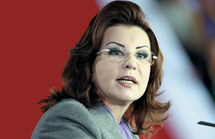
Layla Bin Ali
In a palace statement carried by the official SPA news agency, it said the move was "out of concern for the exceptional circumstances facing the brotherly Tunisian people and in support of the security and stability of their country."
Ben Ali's plane landed overnight in the Red Sea city of Jeddah, a Saudi source said earlier.
By taking him in, the Saudis wanted to "defuse" the tensions on the streets of Tunisia. It was certainly "not out of sympathy" for Ben Ali, said Mustafa Alani, research director at the Gulf Research Centre, a Dubai think-tank.
The Saudis had two options -- either they "contribute to solving the problem by giving him refuge" or "let him stay in the country ... (where) things would go from bad to worse," said the analyst.
Ben Ali, renowned for cracking down on Islamists, had to finally settle in ultra-conservative Saudi Arabia as he was refused asylum by one of his closest allies, France.
"It might be ironic for a person who fought the hijab (Muslim women's head cover) to end up being given asylum in an Islamic state," said Riad Kahwaji, head of the Dubai-based Institute for Near East and Gulf Military Analysis.
"His wife will have to live veiled, under the law there," he said.
In a post on Saudi news website sabq.org, one reader wrote: "Only now does the dictator who fought religion and the religious get to know the land of the two holy shrines (Mecca and Medina) ... You and your wife are not welcome."
"We hope the kingdom will help us bring this man (Ben Ali) to justice, if needed," said another post under the name of "citizen" on the Dubai-based and Saudi-owned alarabiya.net news website.
However, Ben Ali had to accept "a long list of conditions" before the secular leader was given asylum in Saudi Arabia, including being "shut out of the media and out of politics," according to Alani.
Several other leaders who found refuge in Saudi Arabia were taken under the same conditions, said Abdul Aziz al-Sager, chairman of the Gulf Research Centre.
Until his death in 2003, Uganda's ex-president Idi Amin spent more than two decades in exile in the oil-rich kingdom, kept away from politics and the media.
Saudi Arabia, whose law allows for political asylum in public interest cases, also granted asylum to ex-Pakistani premier Nawaz Sharif, who was ousted by Pervez Musharraf and sent into exile in 2000 before returning in 2007.
"Sharif was not allowed to carry out any political activity in Saudi Arabia. When he decided to return to politics, he left Saudi Arabia," said Sagr.
Both Ani and Sagr agreed that the ousted president and his family were unlikely to stay long in the Gulf monarchy. "His lifestyle will not fit in with the kingdom," said Sagr.
--------------------------------------------------------------------------------
Ben Ali's plane landed overnight in the Red Sea city of Jeddah, a Saudi source said earlier.
By taking him in, the Saudis wanted to "defuse" the tensions on the streets of Tunisia. It was certainly "not out of sympathy" for Ben Ali, said Mustafa Alani, research director at the Gulf Research Centre, a Dubai think-tank.
The Saudis had two options -- either they "contribute to solving the problem by giving him refuge" or "let him stay in the country ... (where) things would go from bad to worse," said the analyst.
Ben Ali, renowned for cracking down on Islamists, had to finally settle in ultra-conservative Saudi Arabia as he was refused asylum by one of his closest allies, France.
"It might be ironic for a person who fought the hijab (Muslim women's head cover) to end up being given asylum in an Islamic state," said Riad Kahwaji, head of the Dubai-based Institute for Near East and Gulf Military Analysis.
"His wife will have to live veiled, under the law there," he said.
In a post on Saudi news website sabq.org, one reader wrote: "Only now does the dictator who fought religion and the religious get to know the land of the two holy shrines (Mecca and Medina) ... You and your wife are not welcome."
"We hope the kingdom will help us bring this man (Ben Ali) to justice, if needed," said another post under the name of "citizen" on the Dubai-based and Saudi-owned alarabiya.net news website.
However, Ben Ali had to accept "a long list of conditions" before the secular leader was given asylum in Saudi Arabia, including being "shut out of the media and out of politics," according to Alani.
Several other leaders who found refuge in Saudi Arabia were taken under the same conditions, said Abdul Aziz al-Sager, chairman of the Gulf Research Centre.
Until his death in 2003, Uganda's ex-president Idi Amin spent more than two decades in exile in the oil-rich kingdom, kept away from politics and the media.
Saudi Arabia, whose law allows for political asylum in public interest cases, also granted asylum to ex-Pakistani premier Nawaz Sharif, who was ousted by Pervez Musharraf and sent into exile in 2000 before returning in 2007.
"Sharif was not allowed to carry out any political activity in Saudi Arabia. When he decided to return to politics, he left Saudi Arabia," said Sagr.
Both Ani and Sagr agreed that the ousted president and his family were unlikely to stay long in the Gulf monarchy. "His lifestyle will not fit in with the kingdom," said Sagr.
--------------------------------------------------------------------------------









 Home
Home Politics
Politics









